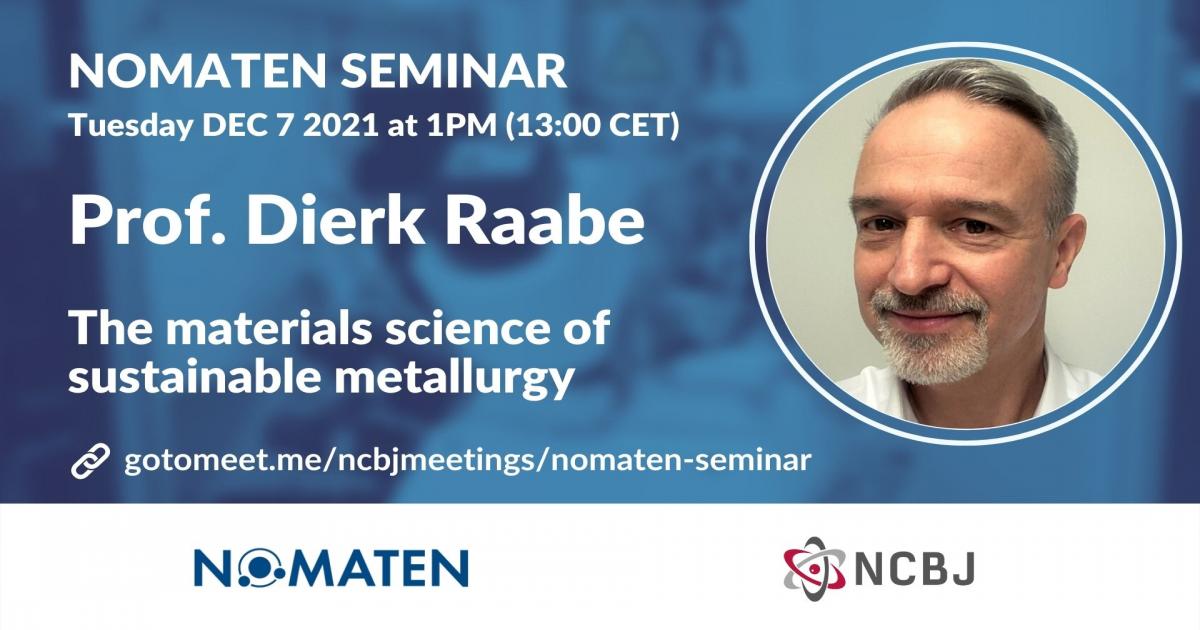SPECIAL SEMINAR by prof. Dierk Raabe on Tuesday DECEMBER 7 2021 at 1PM (CET): The Materials Science of Sustainable Metallurgy
Date
2021-12-07, 14:00
Date 2
2021-12-07, 14:00
Place
https://www.gotomeet.me/NCBJmeetings/nomaten-seminar
NOMATEN Seminar
Tuesday, DECEMBER 7, 2021 at 1PM CET (13:00)
Prof. Dierk Raabe, Max-Planck Institut für Eisenforschung, Düsseldorf, Germany
The materials science of sustainable metallurgy
ABSTRACT:
The presentation is about the sustainability of metallic alloys, specifically steels and aluminium alloys. Metals have enabled technological progress over millennia, paving the path of human civilization with load-bearing and functional applications that can be used under harsh environmental conditions, from the Bronze Age onwards. Only metallic materials encompass such diverse features as strength, hardness, workability, damage tolerance, joinability, ductility and toughness, often combined with functional properties such as corrosion resistance, thermal and electric conductivity and magnetism [1].
Today we produce and consume about 2 billion tons of metals every year, with steels alone standing for an annual production of currently 1.85 billion tons. The huge and accelerating demand for load-bearing (structural) and functional metallic alloys in key sectors such as green energy supply, infrastructures, health, durable construction, robotics, passenger safety and modern transportation is resulting in predicted production growth rates of up to 200% until 2050 [2]. Most of these materials, specifically steel, aluminium, nickel and titanium, require a lot of energy when extracted and manufactured and these processes emit large amounts of greenhouse gases and pollution. This means that the huge success of metallic products and industries also brings them into a position where they have an essential role in addressing environmental aspects [3].
The vast availability of metals (some of the elements used in alloys are among the most abundant ones), efficient mass producibility, low price and amenability to large-scale industrial production (from extraction to the alloy) and manufacturing (downstream operations after solidification) have become a substantial environmental burden: worldwide production of metals leads to a total consumption of about 8% of the global energy used and 35% of all industrial CO2-equivalent emissions when counting only steels and aluminium alloys [1,2].
This lecture presents several aspects related to this field, with a focus on methods for improving the sustainability of steels, in areas including reduced-carbon-dioxide primary production [3,4], recycling and scrap-compatible alloy design. The lecture also discusses the effectiveness and technological readiness of individual measures and also shows how novel structural materials enable improved energy efficiency through their reduced mass, higher thermal stability and better mechanical properties than currently available alloys [2].
[1] youtube: Sustainable Metallurgy and Green Metals https://www.youtube.com/watch?v=1kihsaLSxv0
[2] Raabe D, Tasan CC, Olivetti EA. Strategies for improving the sustainability of structural metals. Nature. 2019 Nov; 575 (7781): 64-74.
[3] SH Kim, X Zhang, Y Ma, IR Souza Filho, K Schweinar, et al. Influence of microstructure and atomic-scale chemistry on the direct reduction of iron ore with hydrogen at 700° C, Acta Materialia, 2021
[4] IR Souza Filho, Y Ma, M Kulse, D Ponge, B Gault, et al. Sustainable steel through hydrogen plasma reduction of iron ore: Process, kinetics, microstructure, chemistry, Acta Materialia, 2021
BIO:
Dierk Raabe studied music (conservatorium Wuppertal), metallurgy and metal physics (RWTH Aachen). After his doctorate 1992 and habilitation 1997 at RWTH Aachen he worked at Carnegie Mellon University (Pittsburgh) and at the National High Magnet Field Lab (Tallahassee) and joined Max Planck Society as a director in 1999.
His interests are in sustainable metallurgy, alloy design, computational materials science and atom probe tomography. He received the Leibniz Award (the highest German scientific award) and an ERC Advanced Grant (the highest European research grant).

Copyright NOMATEN 2017-2024






